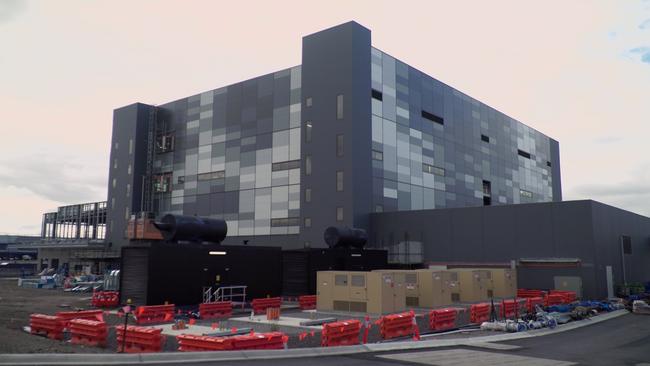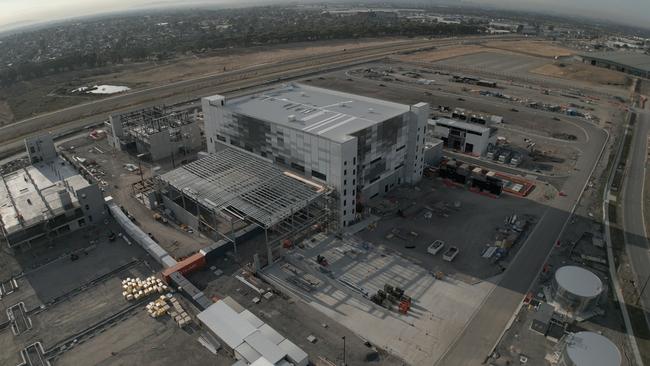Construction tops out at CSL’s $800m flu vaccine factory with production set to begin in 2026
A new factory in Melbourne’s northern suburbs will form the centrepiece of CSL’s arsenal in fighting future pandemics.

Construction of CSL’s $800m cell-based influenza vaccine factory in Melbourne – the only one of its kind in the Southern Hemisphere – has climaxed just as more than half of US adults say they won’t get the jab.
The new factory in Tullamarine has reached “topping out” – when the last beam is fitted on top of a structure. It comes as vaccine hesitancy has been rising, following multiple Covid-19 shots, concerns about potential side effects and widespread misinformation.
But CSL’s commitment to building the new factory – which will allow rapid production during a future pandemic and produce other lifesaving products such as snake anti-venoms – underscores that seasonal vaccines remain a key plank in protecting public health.
The facility replicates a similar facility that CSL’s vaccine division Seqirus operates at Holly Springs in North Carolina, where it has been producing stockpiles of bird flu vaccines for the US government in preparation for a future pandemic.
The US National Foundation for Infectious Diseases found late last year that only 49 per cent of American adults said they were planning to get a flu shot this season. This is despite warnings that this year’s flu season will be the worst in a decade as people socialise again after three winters of mandatory isolation and other pandemic restrictions.
In Australia, CSL Seqirus accelerated production of this year’s vaccines after infections spiked two months earlier than normal.

The nation’s biggest businesses have been rethinking how they promote free vaccines to employees to combat jab fatigue.
CSL Seqirus executive medical director Jonathan Anderson, a former GP, said influenza had a “big impact on society and healthcare”. “When I was a GP I saw lots of people get the real flu and if you’ve ever had the real flu, you take it seriously,” he said.
“We saw that last year, anecdotally, with people saying their whole family was affected by flu and they would never forget to get a flu vaccine after that.
“What we need to do is to continue to remind people that flu hasn’t gone away, flu came back last year, flu is likely to come back … flu isn’t a trivial cold. It’s a disease that can have a significant impact on a lot of people and that impact then can lead to … more serious strife.”
CSL expects to start producing the first batches of its cell-based influenza vaccines at its new Melbourne factory from 2026. Cell-based vaccines differ from conventional protein-based shots that are produced in eggs. They can be produced in higher volumes at shorter notice.
“Avoiding eggs in the manufacture of vaccines is really the principal gain,” Dr Anderson said.
“If … we have a pandemic of influenza, we want to be able to produce lots of vaccine very quickly.” If the birds have been affected by avian influenza that can put constraints on how you produce the vaccine against the pandemic.
“So having a cell-based facility allows us to take this cell culture and grow vaccines in the even of a pandemic and be able to respond quickly.”

CSL’s new generation of influenza vaccine, Flucelvax Quad, won regulatory approval for use on toddlers early last year. It uses cell-based technology, which results in a close match to influenza strains identified by the World Health Organisation.
“It’s a vaccine that starts without having to be adapted to grow in eggs. That means that vaccine that we take from the World Health Organisation, we don’t need to adapt to grow in those cells, which is something that is a potential advantage for the manufacturing process, and certainly allows us to produce a vaccine from that strain,” Dr Anderson said.
CSL Seqirus vice-president and program lead for the new Melbourne factory, Jonah Smith, said it would create a supply chain worth more than $300m annually. It will also produce the world’s only approved human vaccine for Q fever.
“The facility is on track to be operational by 2026. We expect to reach completion of the buildings in 2024 and then we‘ve got a very critical commissioning qualification phase – working with our regulators to register the new sites and products, and bring the site online by 2026,” Mr Smith said.






To join the conversation, please log in. Don't have an account? Register
Join the conversation, you are commenting as Logout